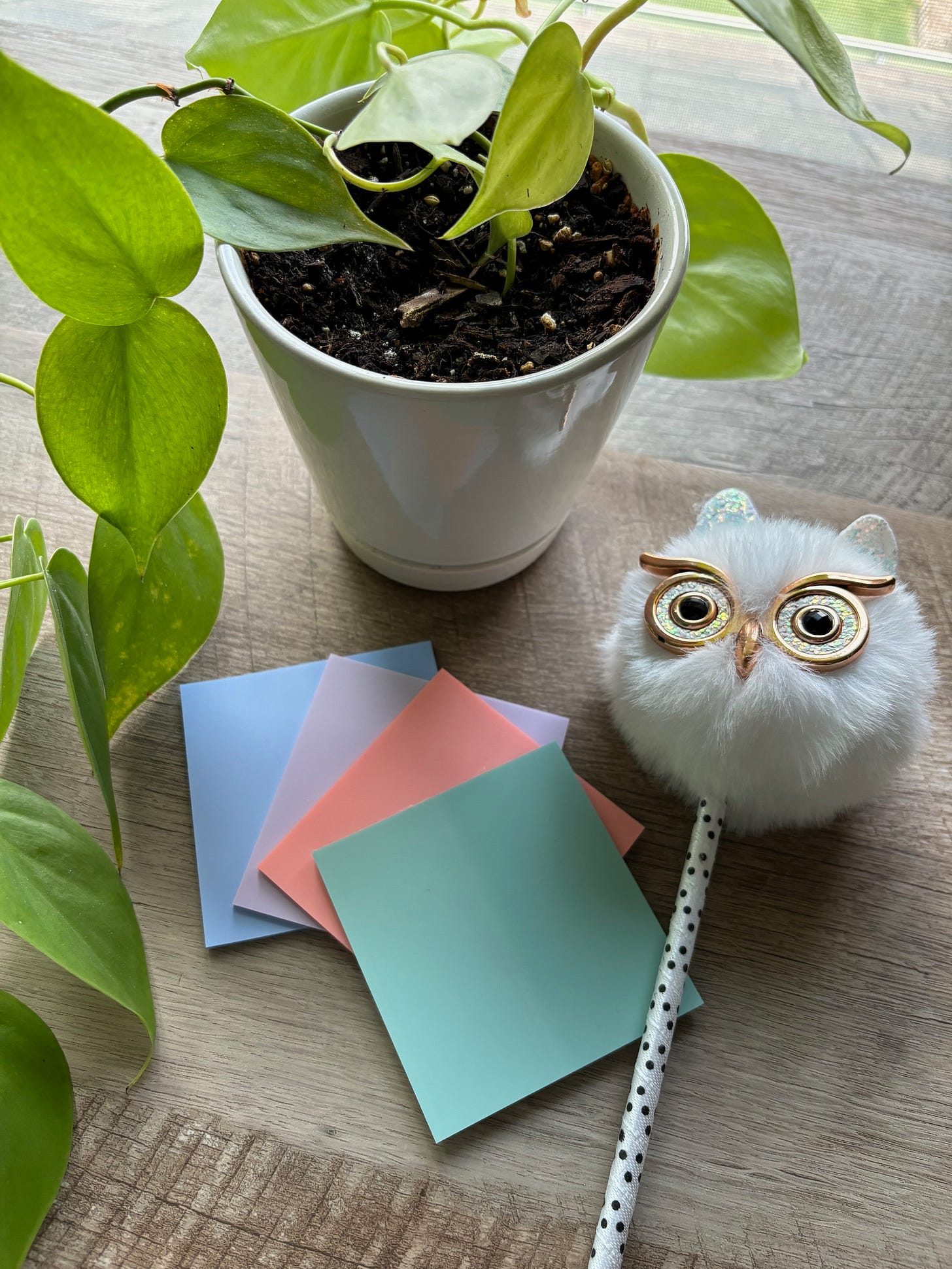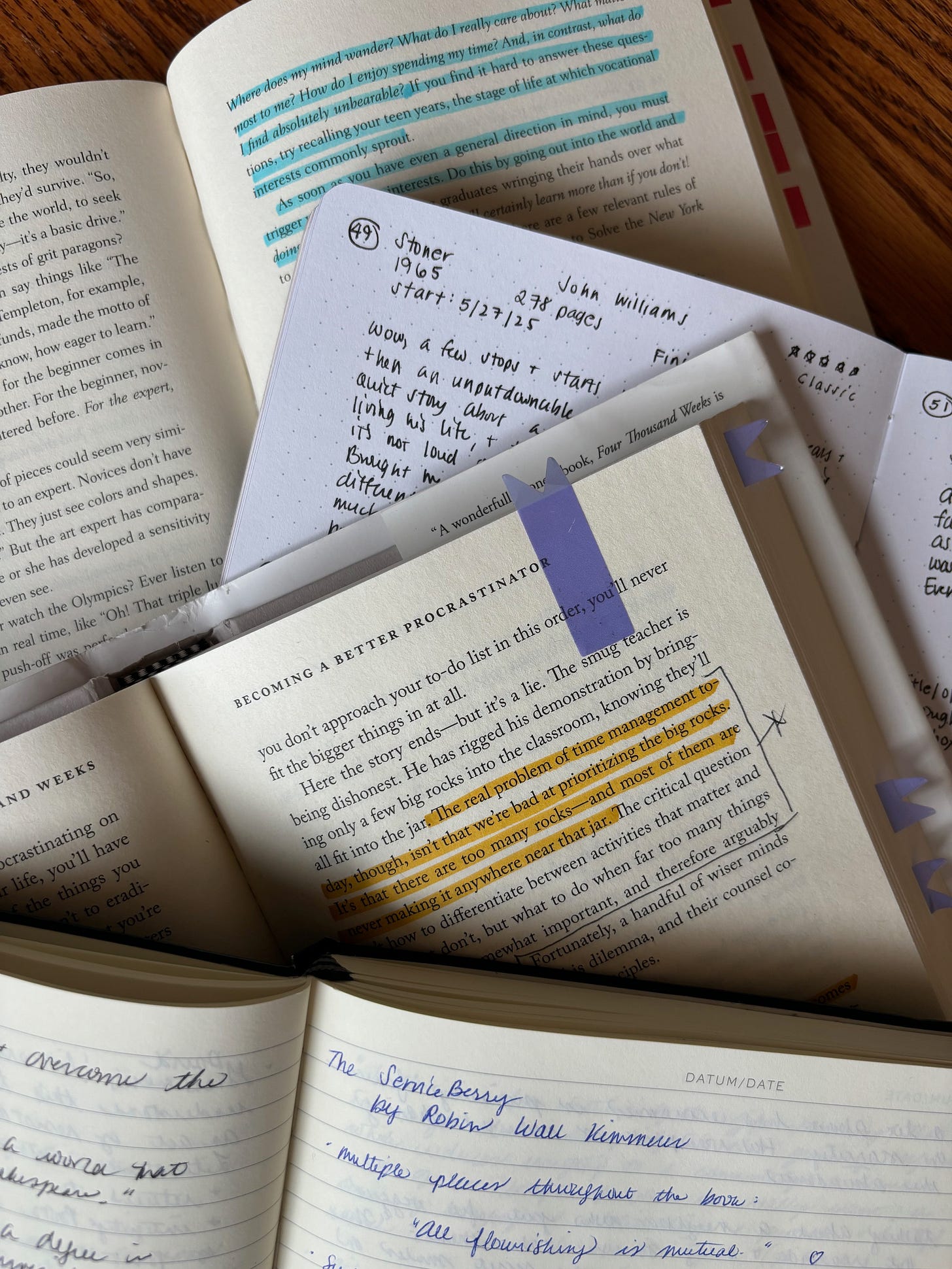Becoming A More Purposeful Reader
Five ideas to help you make the most of your reading experience, whether you read 1 or 150 books per year.
Let me start by saying you don’t have to do any of what I suggest here.
Maybe that’s a terrible way to begin an article that I do hope you’ll actually read, enjoy, and gain value from. But honestly, read however best suits you. If your reading life serves your needs and adds to your quality of life, keep on keeping on!
So while I’m not posing this as a bookish to-do list by any means, I do often get asked how to bring more purpose into everyday activities, such as reading. Here are five practical ways you can do just that, perhaps becoming more intentional with - and gaining more from - your reading in the process. Enjoy!
1. Consider your ‘why’.
To become a more purposeful reader, start by considering your purpose for reading. You can do this periodically throughout your life, to remind yourself how you benefit from this hobby. You can also do this at the start of each new book, to help you be intentional with your reading while also gaining the most from the experience.
For example, are you reading the book to learn something new? To laugh? To cry? To solve a problem in the world? To momentarily escape? To understand a point of view or way of life different from your own? To pass the time during a stressful waiting room stint?
Knowing your why can enhance your reading experience in myriad ways, and can also help you choose your books accordingly. For instance, I often read to learn something new - particularly with my nonfiction choices - so I also try to make sure I have a highlighter or notebook nearby. I recently had one of those aforementioned stressful waiting room stints, so I brought the fluffiest book I could find that wouldn’t require too much of me, and that I could easily pick up and put down. When you know your why, you can enter the reading experience with intention.
2. Pose questions to guide your reading experience.
In addition to the ‘why’ question inherent in #1 above, preparing a few questions for which to seek out answers while you read can also make your reading more intentional. For example, are there certain things you want to learn or take away from the book - maybe tips you can apply from your nonfiction read to a real-life situation, or clues about what society was like during the time your classic was written?
Each month, I post questions to consider while, or after, reading our selection for the Reading And Purpose Nonfiction Book Club (you can see an example here and here). Members often share how they appreciate having some thoughts to ponder while they read, plus these items can serve as launchpads for our book club discussions, too.
Questions you might ask yourself upon completing a book could include things like: What were your big takeaways? What themes were explored throughout the book? What did you learn or gain greater understanding of? What surprised you? What quotes, or character traits, or points of view really spoke to you, and why?
This idea applies to both nonfiction and fiction, by the way. I recently read a romance that, much to my surprise, reminded me to have a conversation with family members about a particular, and rather difficult, topic that I had been putting off. This was not something I would have anticipated in advance, but in pausing afterwards to think about my takeaways from the book, that one came to mind.
Taking a few moments before you dive into the book to note questions you’d like to answer can help guide your reading; reflecting a bit after reading can help solidify your thoughts and learnings.
(And of course you can find reading guides online, but use caution if seeking those out before diving in - particularly with fiction - so you don’t spoil the book for yourself!)
3. Practice immersive reading.
Immersing yourself fully in your reading - that sense of getting lost in a book - honestly feels so rewarding. And while sometimes it’s the writing style or the storyline that draws you in, you can help prompt this experience in a number of ways, too. The most obvious one might be eliminating or minimizing distractions as much as possible during your reading session, such as keeping your phone in another room or bringing just yourself and your book to a local coffee shop, park bench, or library for an hour.
Some people also practice immersive reading by listening to the audiobook on headphones while simultaneously visually reading the printed text or ebook. Anything that helps you feel present and focused can support your immersion into a book.
Personally, the practice that most helps me immerse myself in a book involves annotating, and I’ll nearly always have a highlighter, page flags, and my favorite ‘tools of the trade’ nearby while reading. Again, this applies for both nonfiction and fiction. I wrote about my annotating process extensively earlier this year (see Part 1 here and Part 2 here) so I won’t elaborate further, other than to say you don’t have to get as nerdy as I do with this - a simple pencil or notepad can work wonders!

4. Discuss the book with others.
Herein lies my favorite reason for facilitating the book clubs that I’ve started and being an active member of others! I love how several people can read the exact same book and get such different takeaways from it. I always walk away from book club meetings with a new perspective, a point I completely missed while reading, a greater understanding of someone else or of myself, or any number of other benefits that keep me going back for more. I became so inspired by our July Reading And Purpose book club meeting, in fact, that I even entirely changed (and have stuck to!) my fitness routine since then!
Other discussion possibilities exist in addition to book clubs, too. You and a friend could decide to buddy-read a book, checking in with each other every few chapters or once a week to chat. Or you can post online about a book you finished and ask who else has read it, setting up a discussion or having it right within the comment section.
I recently had such an enjoyable, enlightening, and completely spontaneous conversation with my sister and brother-in-law about an author we had all recently read, and I found that saying some of my thoughts and experiences aloud really helped me clarify for myself why the author’s work has impacted me so much. I left feeling closer to the author’s work as well as to my conversation partners!
5. Create a learning project or growth curriculum around your want-to-read books.
I wrote an entire article on this topic just a few weeks ago, so I encourage you to check that out here if you’d like detailed ideas for how to go about this.
I’ll add, too, that you can create a project like this just for fun as well - for example, if you want to read all the works of a particular author (I’m currently on this kick with Elizabeth Gaskell), or if you want to read a bunch of spooky stories in the fall, or if you want to read all the Women’s Prize for Fiction winners of the last decade. Making it a project can add a bit of oomph to your purposeful reading, especially if you have an achiever nature or simply gain motivation and delight from the act of checking off lists!
What Can You Gain?
As I mentioned, I am often asked how to bring more purpose to everyday life, including with activities like reading and other hobbies.
On the flip side, I am also sometimes asked why put in so much thought and effort - why not just read for fun?
The response that first comes to mind is that for me - an Enneagram 3, a lifelong learner, a lover of goals, and a book nerd with a core value of growth - this is fun! :-)
But even if your definition of fun differs from mine, becoming purposeful with your reading - and with any aspect of life - can enhance the quality of the experience in so many ways. I’d suggest experimenting with some of the ideas presented here especially if you:
Feel like time flies too fast and would like to experience a bit of slowness and savoring;
Constantly seem busy but wonder what you have to show for it;
Notice your attention span shortening;
Often feel scattered, distracted, or pulled in too many different directions at once;
Want to read more, or more deeply.
Which of these ideas do you think you’ll try? What else helps you read more purposefully? Share your ideas, tips, and book recommendations below!
****************
Related articles you may find helpful:
Creating Your Personal Growth Curriculum
Who Are You + Why Are You Here?
Tips + Tools For Prioritizing Your Life
****************
Dr. Christi Hegstad is a Professional Certified Coach (PCC) and self-proclaimed booknerd, here to help you work with meaning, live with purpose, and reach bold + difference-making goals. Peruse coaching opportunities here, email questions to ReadingAndPurpose (at) gmail (dot) com, and check out the above books and more at the Reading And Purpose bookshop.org store (your purchases through these links may earn me a small commission, at no extra cost to you).
Thank you for being here!



Such great tips here! I haven't always been an annotator but I recognize how much it's added to my reading. And discussing books is always my favorite!